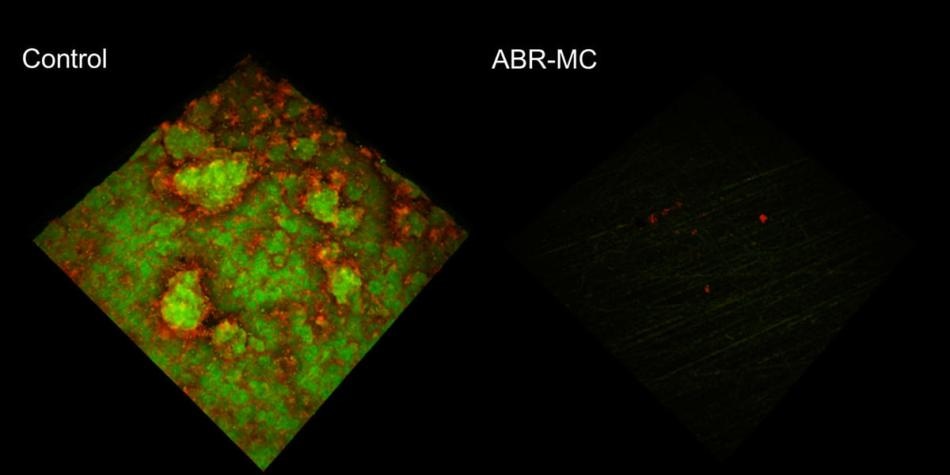Dec 5 2017
Dentists depend on composite materials in order to carry out restorative procedures, such as filling cavities. However, these materials, such as tooth enamel, can be susceptible to the growth of plaque, referring to the sticky biofilm that causes tooth decay.
 Biofilms composed of Streptococcus mutans--a common cause of tooth decay--were much easier to remove when grown on a newly developed dental material (right image), which has an antimicrobial agent within it, compared to a control material. (Credit: University of Pennsylvania)
Biofilms composed of Streptococcus mutans--a common cause of tooth decay--were much easier to remove when grown on a newly developed dental material (right image), which has an antimicrobial agent within it, compared to a control material. (Credit: University of Pennsylvania)
In a recent study, researchers from the University of Pennsylvania examined a new dental material fastened with an antimicrobial compound capable of killing bacteria and resisting biofilm growth. Additionally, unlike some drug-infused materials, it is considered to be effective with minimal toxicity to the nearby tissue, as it comprises of a low dose of the antimicrobial agent that has the potential to kill only the bacteria that come in contact with it.
Dental biomaterials such as these, need to achieve two goals: first, they should kill pathogenic microbes effectively, and, second, they need to withstand severe mechanical stress, as happens when we bite and chew. Many products need large amounts of anti-microbial agents to maximize killing efficacy, which can weaken the mechanical properties and be toxic to tissues, but we showed that this material has outstanding mechanical properties and long-lasting antibiofilm activities without cytotoxicity.
Geelsu Hwang, research assistant professor in Penn’s School of Dental Medicine.
Hwang collaborated on the study, which was featured in the journal ACS Applied Materials and Interfaces, with Penn Dental Medicine professor Hyun (Michel) Koo and Bernard Koltisko and Xiaoming Jin of Dentsply Sirona.
The newly developed material comprises of a resin embedded with the antibacterial agent imidazolium. This material, unlike some standard biomaterials, which slowly discharge a drug, is non-leachable, thus killing only microbes that touch it.
“This can reduce the likelihood of antimicrobial resistance,” Hwang said.
Hwang and colleagues placed the material via its paces, testing its potential to kill microbes, in order to prevent growth of biofilms and also to resist mechanical stress.
Their results proved it to be effective in killing bacterial cells on contact, majorly disrupting the potential of biofilms to grow on its surface. Only small amounts of biofilm matrix, the glue responsible for holding clusters of bacteria together, were able to gather on the experimental material, in comparison to a control composite material, which presented a steady accumulation of sticky biofilm matrix over time.
This was followed by the team studying how much shear force was needed in order to remove the biofilm on the experimental material. While the smallest force removed nearly all the biofilm from the experimental material, even a force four times as powerful was not able to remove the biofilm from the control composite material.
“The force equivalent to taking a drink of water could easily remove the biofilm from this material,” Hwang said.
Hwang, possessing an engineering background, has welcomed the chance to apply his exceptional expertise to problems linked to the dental field. Going forward, he looks forward to further opportunities in order to develop and test groundbreaking products that help in preserving and restoring oral health.
Dentsply Sirona funded the study.